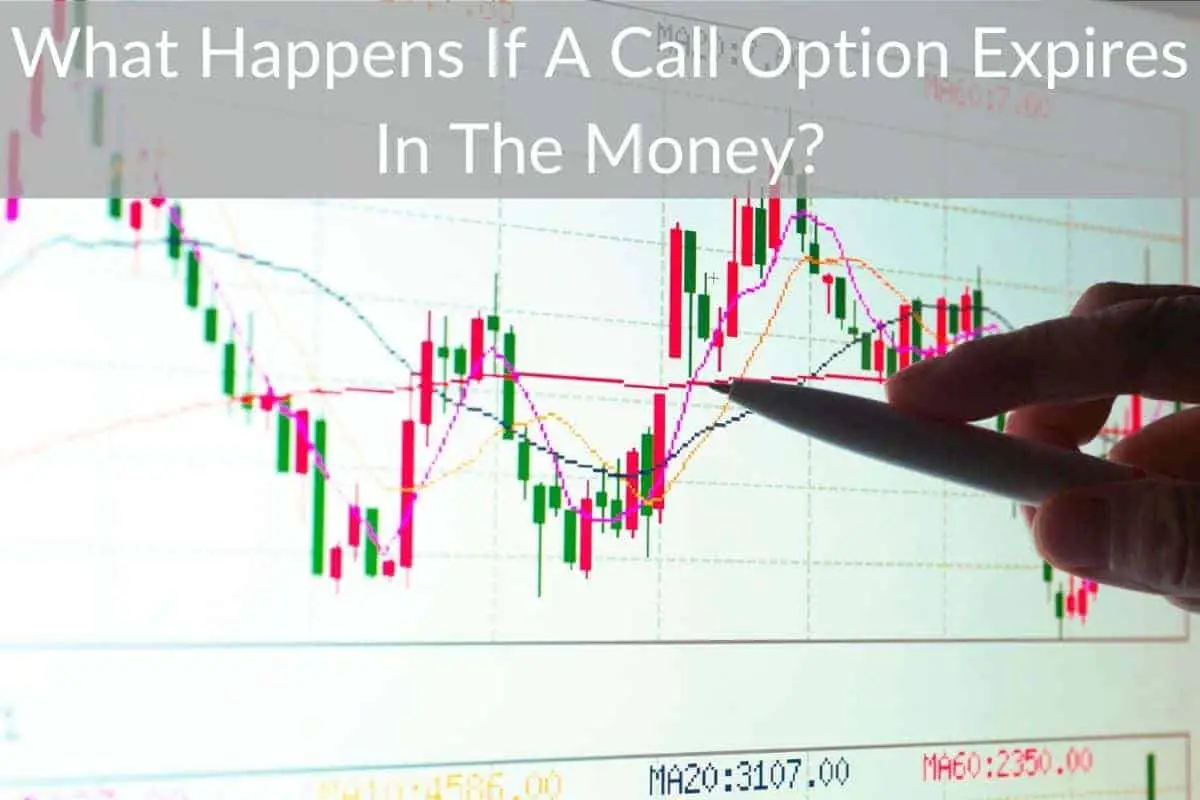Table of Contents
Call options are in the money when the current stock price is higher than the call option’s strike price. All options have an expiration date, and at that point, the call must be exercised, or it will be worthless.
*This post may contain affiliate links. As an Amazon Associate we earn from qualifying purchases.
So, what happens if a call option expires in the money?
If a call option expires in the money, your option has value—and there are two potential courses of action. You can purchase the stock at the option’s strike price (which is cheaper than the current trading price), or sell the option for the same value.
If you do nothing, some brokers will automatically sell the option contract if you don’t have enough money in your account to exercise the option. They do this to ensure that your option doesn’t expire worthless accidentally.
Other brokers will do nothing and if you don’t sell the option or choose to exercise it you will lose the money that you should have made by selling or exercising the call.
Every broker is a little different in how they deal with options that are in the money on the day of expiry so be sure to reach out to their customer support staff to see how your broker handles this scenario.
In this article I will try to explain in more detail what happens when you let your call expire in the money, and how to decide if you should sell or exercise your call option that is in the money.
There are also a few resources you can use to learn more about call options.
What If You Do Nothing When Your Call Option Expires in the Money?
If you do nothing when your call option expires in the money, you will lose out on the profit that you could make on your call option by either selling it or exercising it. This is only true with some brokerages however as some of them will sell the call automatically on the day of expiry of it is in the money.
If your brokerage doesn’t do this then you will not want to miss the expiration date of a call option that is in the money as it will expire worthless if no action is taken by you or your brokerage.
In the United States, you can excise or sell your call option anytime between when you purchase it and when it expires. However, in other parts of the world like Europe, you can only exercise or sell your option on the expiration date.
No matter where you are trading, make sure you do not miss the expiration date of a call option that is in the money. Otherwise, you will lose out on the money you made from your investment.
Should I Sell Or Exercise My Call Option?
When you sell an option, you will be able to capitalize on the movement that the stock has made prior to the expiration of the option. And, if you exercise your option in the money, you will make money because you are paying a lower price per share than if you bought the stock at the current price on the open market.
If you think the stock price will decrease or stay the same, you should sell your call option and just take your profits. If you think the stock price is going to increase if you want to hold the stock long term then you should exercise your call option.
So, when your call option expires in the money, you need to decide if you will exercise the option or if you want to sell it to someone else for them to exercise it.
Most brokerages charge a fee to exercise an option as well so that is something to also consider when you are trying to decide between exercising an option and selling it.
Options clear the next business day so if you sell your option you can’t immediately buy the stock with that money (unless you have a margin account). So if the stock price jumps before the next business day then exercising the option would work out better even with a fee to exercise it.
Of course if you have the money in your account to exercise the option you could just use that to buy shares and sell the option avoiding the fee for exercising and being able to buy the shares immediately.
Selling Your Call Option
Your decision should depend on how you expect the stock price to change. If you expect the stock price to stay the same or decrease, you should sell the option.
When you sell the call option, you will profit from the premium for which you sold it. Then, if the stock price does not change or decreases, you can still buy the stock at the market price.
Since the market price is lower than your strike price (if it drops), you can buy it cheaper than you expected, and you still earn the premium from selling the option.
If the price does end up increasing, you can still profit from the sale, but not as much as if the price did not increase like expected.
For example, say you expected a stock’s price to remain at fifty dollars, and your strike price is $45. So, you sold your call option for five dollars (five hundred dollars total since options are per one hundred shares).
But, the stock price ends up increasing to fifty-three dollars.
You could have exercised your option and made an extra three hundred dollars through the stock price increasing since the price when you sold your call option was fifty dollars and the stock price is now at fifty-three dollars.
Of course there is no way to know if the stock will go up or down so this is purely a hypothetical.
Furthermore, say the stock price increases to sixty dollars instead of the fifty dollars that it was on expiration. You only earned five hundred dollars on your option sale, but if you exercised the option and held the stock, you would have earned one thousand dollars between the strike price of $45 dollars (plus the $5 sale price) and the current price of sixty dollars.
Exercise Your Call Option
If you think the share price will increase higher than the current market price, you will not make as much money if you sell the option. In this case, you should exercise the option so that you can earn money from buying the stock at the strike price, and then hoping the stock goes up further.
For example, say your strike price is fifty dollars, and the price per share increases to fifty-five dollars. When you exercise the option to buy the stock at fifty dollars, you will earn five dollars per share or five hundred dollars per option.
But, if the stock price does not increase but instead decreases, you will lose money, similar to the example in the previous section. When the share price goes down, your strike price is higher than the market value, so you paid more money for the stock than it was worth.
Your loss per share will be the difference between the strike price you exercised at and the current price. Multiply this by one hundred to find your loss per option since options are traded at one hundred shares each.
Learn More About Call Options
Here are some books that will teach you more about call options:
- OPTIONS TRADING: 2 Books In 1: Crash Course + Day Trading A Guide to Learn Various Strategies and Invest Money: Learn the basics of options, when the best time to use them is, and what affects option prices. You will also learn how to avoid common options mistakes that people make and how to choose the best brokerage for trading options.
- The 3 Best Options Strategies For Beginners: The Ultimate Guide To Making Extra Income On The Side By Trading Covered Calls, Credit Spreads & Iron Condors: This book has three strategies that you can utilize to profit from options trading. The book is easy to understand, and it comes with a nine-video course with even more investing information.
Final Thoughts
Call options that are in the money have value. At expiration, or before if you decide, be sure to either sell or exercise your option, so you do not lose out on the money you made on the investment.
If you think the share price will increase even further, you should exercise the option (or sell it and buy the stock). Otherwise, if the price is expected to stay the same or decrease, you should sell the call option for a premium.

